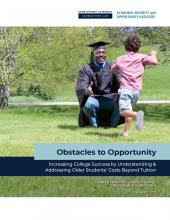Found 5 resources.
Report
Thu, 05/20/2021

 Shared by Housing Is
on May 20, 2021
Shared by Housing Is
on May 20, 2021

Higher education offers millions of people the opportunity to improve their financial well-being. However, higher education is prohibitively expensive and can saddle people with insurmountable debt. Costs beyond tuition—such as housing, food, child care, and transportation—are large, essential components of the cost of attending college for students. In order to better understand how these living costs add up and vary, this report offers estimates of costs beyond tuition for older students between the ages of 25 – 45, who make up roughly one-third of college students and face unique barriers to college access and completion. The report shows that the real cost of college for older students is higher than commonly understood, examines older students’ challenges with financial aid and public benefits programs, and offers policy recommendations to address costs beyond tuition and improve college access and success for older students.
Attendance, Community development, Education, Housing, Post-secondary, Stability, Workforce development
 Shared by Housing Is
on May 20, 2021
Shared by Housing Is
on May 20, 2021
Report
Tue, 01/28/2020
 Shared by Housing Is
on Oct 6, 2020
Shared by Housing Is
on Oct 6, 2020
The nation’s community colleges play a central role in producing a more educated workforce and promoting social mobility. They serve about 40 percent of all college students and, not surprisingly, they serve a disproportionate number of low-income and underrepresented students. But most students who enter these colleges do not graduate — only about a third of entering students earn a degree or certificate within six years.
Among the many programs that have attempted to increase graduation rates, one program stands out. Developed by the City University of New York (CUNY), the Accelerated Study in Associate Programs (ASAP) is a comprehensive program that provides students with up to three years of financial and academic support and other support services. Along with those services and other forms of support comes an obligation to attend full time and participate in essential program services. An experimental evaluation of CUNY ASAP found that the program nearly doubled graduation rates after three years. This report presents findings through three years from a replication of the ASAP model at three community colleges in Ohio.
Attendance, Education, Post-secondary, School-readiness, Workforce development
 Shared by Housing Is
on Oct 6, 2020
Shared by Housing Is
on Oct 6, 2020
Report
Thu, 05/28/2020
 Shared by Housing Is
on Oct 6, 2020
Shared by Housing Is
on Oct 6, 2020
Bridge-to-college programs aim to help people complete high school and enroll in postsecondary education. This evaluation of one such program at Northeast Wisconsin Technical College in Green Bay finds that it helped more students earn their GEDs and enroll in college courses.
Education, Post-secondary, Workforce development
 Shared by Housing Is
on Oct 6, 2020
Shared by Housing Is
on Oct 6, 2020
Report
Thu, 05/02/2019
 Shared by Abra Lyons-Warren
on Oct 6, 2020
Shared by Abra Lyons-Warren
on Oct 6, 2020
Innovative public housing authorities (PHAs) are collaborating with college access partners and community colleges to increase postsecondary educational achievement for low-income residents and college students experiencing homelessness. This report elevates 11 shared learnings from a recent convening of these five pioneering PHAs and their postsecondary collaborators, and offers a series of recommendations to policy makers, PHAs, and philanthropic organizations seeking to develop emerging cross-sector collaborations between housing and education organizations. The report also includes an overview of the federal policies that support and limit postsecondary achievement for students served by PHAs, and profiles of the five partnerships: CHA and partners City Colleges of Chicago and One Million Degrees; CMHA and partner Columbus State Community College; HACLA and partner Southern California College Access Network (SoCal CAN); LMHA and partner Family Scholar House; and THA and partner Tacoma Community College.
CLPHA, Education, Housing, Legislation & Policy, Low-income, Partnerships, Post-secondary, Stability
 Shared by Abra Lyons-Warren
on Oct 6, 2020
Shared by Abra Lyons-Warren
on Oct 6, 2020
Report
Fri, 12/01/2017
 Shared by Cassandra Brooks
on Dec 12, 2017
Shared by Cassandra Brooks
on Dec 12, 2017
Education
 Shared by Cassandra Brooks
on Dec 12, 2017
Shared by Cassandra Brooks
on Dec 12, 2017
Topics
- Education 5 Apply Education filter
- Post-secondary 4 Apply Post-secondary filter
- Workforce development 3 Apply Workforce development filter
- Attendance 2 Apply Attendance filter
- Housing 2 Apply Housing filter
- Stability 2 Apply Stability filter
- 317 1 Apply 317 filter
- CLPHA 1 Apply CLPHA filter
- Community development 1 Apply Community development filter
- Legislation & Policy 1 Apply Legislation & Policy filter
- Low-income 1 Apply Low-income filter
- Partnerships 1 Apply Partnerships filter
- School-readiness 1 Apply School-readiness filter
